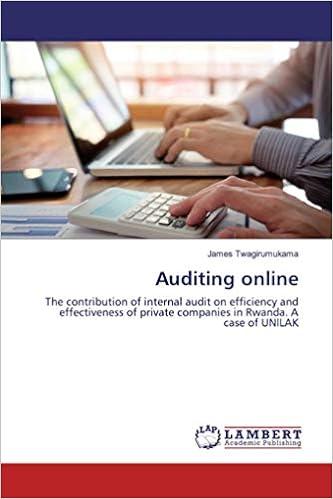Question
7. which of the following is not a component of net periodic pension cost? a. interest cost b. actual return on plan assets c. benefits
7. which of the following is not a component of net periodic pension cost?
a. interest cost
b. actual return on plan assets
c. benefits paid to retirees
d. amortization of prior service cost
9. which of the following concepts for postretirement benefit plans is comparable to the projected benefit obligation (PBO) of pension plans?
a. accumulated postretirement benefit obligation
b. expected postretirement benefit obligation
c. acutal return on plan assets
d. expected return on plan assets
18. which type of contract is unique in that it protects the owner against unfavorable movements in the prices or rates while allowing the owner to benefit from favorable movements
a. interest rate swap
b. forwards contract
c. futures contract
d. option
19. which choice best describes the information that should be disclosed related to derivatives contracts
a. fair value
b. notional amount
c. both a and b
d. neither a or b
20. earnings per share disclosurs are required only for
a. companies with complex capital structures
b. companies that change their capital structures during the reporting period
c. public companies
d. private companies
21. In computing the earnings per share of common stock, noncumulative preferred dividends not declared should be
a. deducted from the net income for the year
b. added to the net income for the year
c. ignored
d. deducted from the net income for the year, net of tax
23. in calculating diluted earnings per share, which of the following should not be considered
a. the weighted average nuymber of common shares outstanding
b. the amount of dividends declared on cumulative preferred shares
c. the amount of cash dividends declared on common shares
d. the number of common shares resulting from the assumed conversions of debentures
24. the EPS computation that is forward-looking and based on assumptions about future transactions is
a. diluted EPS
b. basic EPS
c. continuing operations EPS
d. extraordinary EPS
25. When computing diluted earnings per share, stock options are
a. recognizing only if they are dilutive
b. recognizing only if they are antidilutive
c. recognizing only if they were exercised
d. ignored
26. In applying the treasury stock method of computing diluted earnings per share, when is it appropriate to use the average market price of common stock duruing the year as assumed repurchase price
a. always
b. never
c. when the average market price is higher than the exercise price
d. when the average market price is lower than the exercise price
27. earnings per share information should be reported for all of the following except
a. continuing operations
b. extraordinary gains
c. net income
d. cash flows from operating activities
28. the if-converted method of computing EPS data assumes conversion of convertible securities at the
a. beginning of the earliest period reported(or at time of issuance, if later)
b. beginning of the earliest period reported (regardless of time of issuance)
c. middle of the earliest period reported (regardless of time of issuance)
d. ending of the earliest period reported (regardless of time of issuance)
29. when computing dilutive EPS, the treasury stock method can be used for all of the following except
a. convertible preferred stock
b. stock warrants
c. stock options
d. stock rights
Step by Step Solution
There are 3 Steps involved in it
Step: 1

Get Instant Access to Expert-Tailored Solutions
See step-by-step solutions with expert insights and AI powered tools for academic success
Step: 2

Step: 3

Ace Your Homework with AI
Get the answers you need in no time with our AI-driven, step-by-step assistance
Get Started


